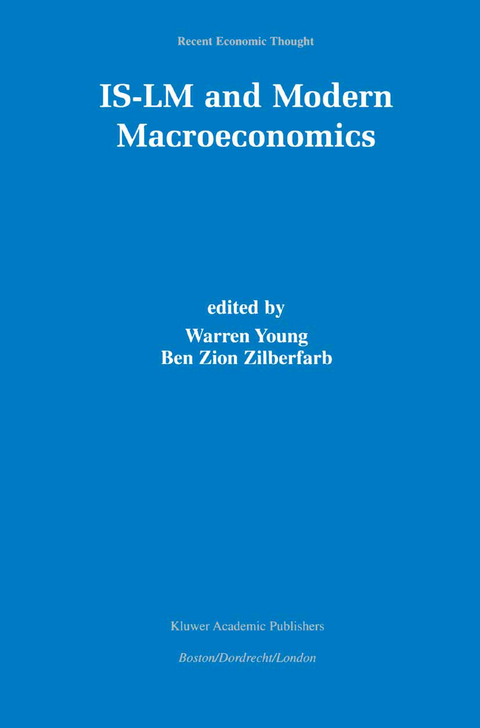
IS-LM and Modern Macroeconomics
Seiten
2001
Springer (Verlag)
978-0-7923-7966-9 (ISBN)
Springer (Verlag)
978-0-7923-7966-9 (ISBN)
On the other hand, the same economists realize the limitations of the basic IS-LM model and would not now use it for policy analysis, as they did in the past. Indeed, even those who would reject using the model for modern policy analysis still see the basic model as useful for teaching purposes.
IS-LM is perhaps the prime example of `cognitive dissonance' in economics, and is problematic to many economists. On the one hand, the IS-LM model is still taught by many academic economists or they use it to derive the AD-AS approach. On the other hand, the same economists realize the limitations of the basic IS-LM model and would not now use it for policy analysis, as they did in the past. The distinction between pedagogical and analytical efficacy is made by all the authors in this volume regarding the IS-LM model. Indeed, even those who would reject using the model for modern policy analysis still see the basic model as useful for teaching purposes. Moreover, in an augmented form, some of the authors in this volume would even see fit to use IS-LM for modern policy analysis. As will be seen, therefore, the IS-LM model is `not yet dead'. Rather, the model's `plasticity' has enabled it to undergo a metamorphosis into augmented form, enabling its continuing utilization in economics accordingly.
IS-LM is perhaps the prime example of `cognitive dissonance' in economics, and is problematic to many economists. On the one hand, the IS-LM model is still taught by many academic economists or they use it to derive the AD-AS approach. On the other hand, the same economists realize the limitations of the basic IS-LM model and would not now use it for policy analysis, as they did in the past. The distinction between pedagogical and analytical efficacy is made by all the authors in this volume regarding the IS-LM model. Indeed, even those who would reject using the model for modern policy analysis still see the basic model as useful for teaching purposes. Moreover, in an augmented form, some of the authors in this volume would even see fit to use IS-LM for modern policy analysis. As will be seen, therefore, the IS-LM model is `not yet dead'. Rather, the model's `plasticity' has enabled it to undergo a metamorphosis into augmented form, enabling its continuing utilization in economics accordingly.
Introduction: Quo Vadis IS-LM.- 1. Old, New and Post Keynesian Perspectives on the IS-LM Framework: A Contrast and Evaluation.- 2. Post Walrasian Macroeconomics and IS/LM Analysis.- 3. IS-LM and Aggregate Demand: A Restatement.- 4. How to Construct IS and LM Curves in the Spirit of Hicks Or, Why We Do Not Need the Aggregate Demand Curve.- 5. On Money in ISLM and AD/AS Models.- 6. IS-LM and Leijonhufvud’s Re-Appraisal.- 7. IS-LM and Macroeconometric Models.- 8. Macroeconomics without IS-LM: a Counterfactual.- 9. What Keynes Would Have Thought of the Development of IS-LM.- 10. The IS-LM Model: Its Role in Macroeconomics.
| Reihe/Serie | Recent Economic Thought ; 73 |
|---|---|
| Zusatzinfo | IX, 166 p. |
| Verlagsort | Dordrecht |
| Sprache | englisch |
| Maße | 155 x 235 mm |
| Themenwelt | Geschichte ► Teilgebiete der Geschichte ► Wirtschaftsgeschichte |
| Wirtschaft ► Volkswirtschaftslehre ► Finanzwissenschaft | |
| Wirtschaft ► Volkswirtschaftslehre ► Makroökonomie | |
| ISBN-10 | 0-7923-7966-7 / 0792379667 |
| ISBN-13 | 978-0-7923-7966-9 / 9780792379669 |
| Zustand | Neuware |
| Haben Sie eine Frage zum Produkt? |
Mehr entdecken
aus dem Bereich
aus dem Bereich
die Ukraine, Polen und der Irrweg in der russischen Geschichte
Buch | Hardcover (2023)
C.H.Beck (Verlag)
28,00 €
eine Globalgeschichte des Kapitalismus
Buch | Hardcover (2023)
C.H.Beck (Verlag)
38,00 €


